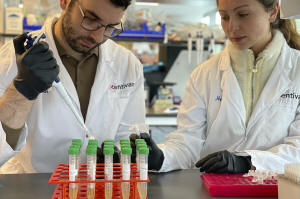Snakes have bitten this man hundreds of times. His blood could help make
a better treatment
[May 03, 2025]
By ADITHI RAMAKRISHNAN
NEW YORK (AP) — Tim Friede has been bitten by snakes hundreds of times —
often on purpose. Now scientists are studying his blood in hopes of
creating a better treatment for snake bites.
Friede has long had a fascination with reptiles and other venomous
creatures. He used to milk scorpions' and spiders' venom as a hobby and
kept dozens of snakes at his Wisconsin home.
Hoping to protect himself from snake bites — and out of what he calls
“simple curiosity” — he began injecting himself with small doses of
snake venom and then slowly increased the amount to try to build up
tolerance. He would then let snakes bite him.
“At first, it was very scary," Friede said. “But the more you do it, the
better you get at it, the more calm you become with it.”
While no doctor or emergency medical technician — or anyone, really —
would ever suggest this is a remotely good idea, experts say his method
tracks how the body works. When the immune system is exposed to the
toxins in snake venom, it develops antibodies that can neutralize the
poison. If it's a small amount of venom the body can react before it's
overwhelmed. And if it's venom the body has seen before, it can react
more quickly and handle larger exposures.

Friede has withstood snakebites and injections for nearly two decades
and still has a refrigerator full of venom. In videos posted to his
YouTube channel, he shows off swollen fang marks on his arms from black
mamba, taipan and water cobra bites.
“I wanted to push the limits as close to death as possible to where I’m
just basically teetering right there and then back off of it," he said.
But Friede also wanted to help. He emailed every scientist he could
find, asking them to study the tolerance he'd built up.
And there is a need: Around 110,000 people die from snakebite every
year, according to the World Health Organization. And making antivenom
is expensive and difficult. It is often created by injecting large
mammals like horses with venom and collecting the antibodies they
produce. These antivenoms are usually only effective against specific
snake species, and can sometimes produce bad reactions due to their
nonhuman origins.
[to top of second column]
|

This photo provided by Centivax shows Mark Bellin and Hannah Hirou
who are involved in efforts to produce an antivenom to counteract
the bites of various snakes, at a lab in South San Francisco,
Calif., in 2025. (Centivax via AP)
 When Columbia University's Peter
Kwong heard of Friede, he said, “Oh, wow, this is very unusual. We
had a very special individual with amazing antibodies that he
created over 18 years.”
In a study published Friday in the journal Cell, Kwong and
collaborators shared what they were able to do with Friede's unique
blood: They identified two antibodies that neutralize venom from
many different snake species with the aim of someday producing a
treatment that could offer broad protection.
It's very early research — the antivenom was only tested in mice,
and researchers are still years away from human trials. And while
their experimental treatment shows promise against the group of
snakes that include mambas and cobras, it's not effective against
vipers, which include snakes like rattlers.
“Despite the promise, there is much work to do,” said Nicholas
Casewell, a snakebite researcher at Liverpool School of Tropical
Medicine in an email. Casewell was not involved with the new study.
Friede's journey has not been without its missteps. Among them: He
said after one bad snake bite he had to cut off part of his finger.
And some particularly nasty cobra bites sent him to the hospital.
Friede is now employed by Centivax, a company trying to develop the
treatment and that helped pay for the study. He's excited that his
18-year odyssey could one day save lives from snakebite, but his
message to those inspired to follow in his footsteps is simple:
“Don't do it," he said.
All contents © copyright 2025 Associated Press. All rights reserved
 |